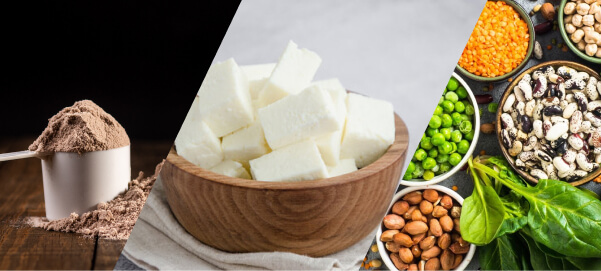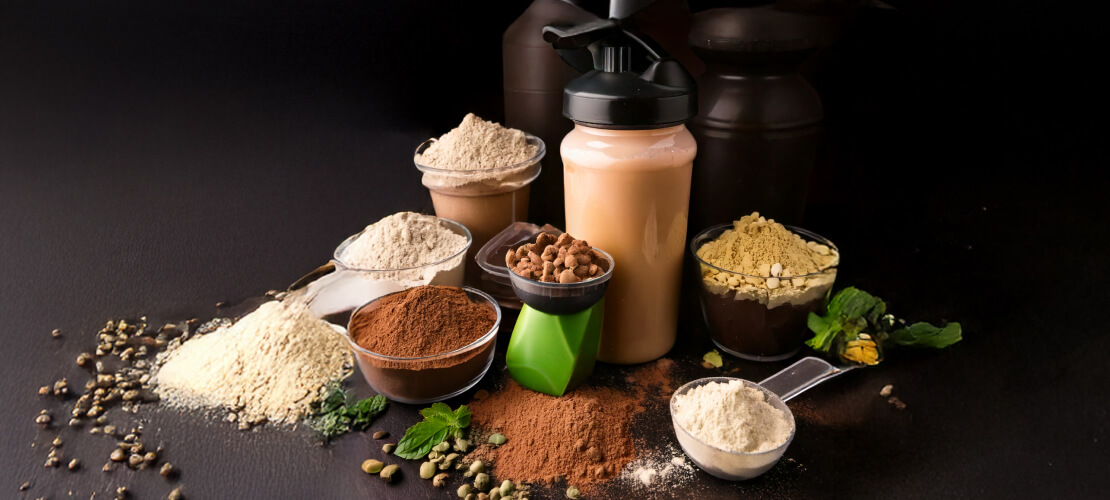Protein powder has become a staple in fitness and nutrition, helping people meet their daily protein requirements conveniently. Whether you’re a fitness enthusiast, an athlete, or someone looking to enhance your diet, understanding what’s inside one scoop of protein powder is essential. This article provides a complete nutritional breakdown of nutritional content in a scoop of protein powder, covering its macronutrients, ingredients, and caloric content.
Macronutrients in One Scoop of Protein Powder
Protein powder is designed to deliver a concentrated dose of essential macronutrients to support muscle growth, recovery, and overall health. Here’s what you can typically expect in one scoop:
1. Protein Content
- Most protein powders contain 20-30 grams of protein per scoop.
- Supports muscle repair and growth.
- Helps in satiety and weight management.
2. Calories in One Scoop
- A scoop of protein powder generally contains100-150 calories.
- Caloric content depends on the type of protein (whey, casein, plant-based, etc.) and added ingredients.
3. Carbohydrates
- Ranges from 1-10 grams per scoop, depending on added sugars or fiber.
- Some protein powders contain low carbs, ideal for ketogenic diets.
4. Fats
- Typically 1-5 grams of fat per scoop.
- Some formulations contain MCTs (medium-chain triglycerides) for sustained energy.
Ingredients in a Scoop of Protein Powder
Protein powders contain a mix of essential ingredients that enhance their nutritional profile. Here are the most common ones:
1. Protein Sources
- Whey protein concentrate/isolate: Derived from milk; fast-absorbing.
- Casein protein: Slow-digesting protein, ideal for nighttime consumption.
- Plant-based proteins: Pea, soy, hemp, or brown rice protein for vegan-friendly options.
2. Flavoring Agents
- Natural or artificial flavors: Added to improve taste and palatability. Natural flavors come from plant or animal sources, while artificial ones are synthetically created.
- Cocoa powder: Commonly used in chocolate-flavored protein powders. Provides a rich taste and some additional antioxidants.
- Vanilla bean extract: A natural flavor enhancer that adds a sweet and creamy taste.
3. Sweeteners
- Natural options (Stevia, Monk Fruit Extract): Stevia is a plant-based sweetener with zero calories, while monk fruit extract provides sweetness without spiking blood sugar levels.
- Artificial sweeteners (Sucralose, Aspartame): These are calorie-free synthetic sweeteners that mimic the taste of sugar and are commonly found in low-calorie or sugar-free protein powders.
- Sugar alcohols (Xylitol, Erythritol): These are used in some protein powders to reduce overall sugar content while still providing a sweet taste. They have fewer calories than sugar but may cause mild digestive discomfort in sensitive individuals.
4. Thickening Agents & Stabilizers
- Guar Gum & Xanthan Gum: These are natural fiber-based thickeners that improve texture and consistency in protein powders. They help create a smooth, creamy shake when mixed with liquids.
- Sunflower & Soy Lecithin: Lecithins act as emulsifiers, ensuring the protein powder mixes well with liquids without clumping. Sunflower lecithin is a preferred option for those avoiding soy-based ingredients.
5. Additional Nutrients
- BCAAs (Branched-Chain Amino Acids):These essential amino acids (leucine, isoleucine, and valine) help with muscle recovery, reduce muscle soreness, and support endurance during workouts.
- Vitamins & Minerals (Calcium, Magnesium, B Vitamins): Many protein powders include added vitamins and minerals to support overall health. Calcium aids bone strength, magnesium helps with muscle function, and B vitamins support energy metabolism.
- Digestive Enzymes (Protease, Lactase, Papain, Bromelain): These enzymes help break down protein into amino acids, improving digestion and absorption. Lactase is particularly beneficial for those who have difficulty digesting dairy-based proteins.
Types of Protein Powders and Their Nutritional Differences

1. Whey Protein
- Best for: Post-workout recovery and muscle building.
- Protein per scoop: 24-30g.
- Carbs per scoop: 1-5g.
- Fat per scoop: 1-3g.
2. Casein Protein
- Best for: Sustained protein release, night-time consumption.
- Protein per scoop: 20-26g.
- Carbs per scoop: 2-6g.
- Fat per scoop: 1-4g.
3. Plant-Based Protein
- Best for: Vegan and dairy-free consumers.
- Protein per scoop: 18-25g.
- Carbs per scoop: 3-10g.
- Fat per scoop: 1-5g.
Benefits of Protein Powder Beyond Muscle Building
Protein powders are commonly associated with muscle growth, but their benefits extend beyond bodybuilding. Here are some additional advantages:
1. Weight Management
- Helps in reducing appetite by promoting satiety.
- Boosts metabolism, aiding in fat loss.
- Supports lean muscle retention during weight loss.
2. Improved Recovery and Performance
- Reduces muscle soreness post-exercise.
- Enhances endurance and stamina for workouts.
- Provides sustained energy levels throughout the day.
3. Convenience and Versatility
- Easy to consume on-the-go.
- Can be incorporated into various recipes (smoothies, protein bars, pancakes).
- A great height growth supplement for teenagers and adults.
Common Myths About Protein Powder

1. Protein Powder Causes Kidney Damage
- No scientific evidence supports this claim in healthy individuals.
- Excessive protein intake may be a concern for those with pre-existing kidney conditions.
2. Only Bodybuilders Need Protein Powder
- Protein powder benefits anyone looking to meet daily protein requirements.
- Useful for athletes, vegetarians, elderly individuals, and busy professionals.
3. Plant-Based Protein Is Inferior to Whey Protein
- High-quality plant-based proteins can provide a complete amino acid profile.
- Blended plant proteins (pea, rice, soy) offer similar benefits as whey protein.
A Word from BIONE
At BIONE, we believe in providing high-quality, science-backed best supplement for height growth in india. Our height growth protein powder is designed with carefully sourced ingredients to ensure optimal protein intake, clean nutrition, and superior taste. Whether you’re looking for whey, casein, or plant-based protein, we ensure that every scoop delivers the best nutritional value for your body.
For more details, explore our range of protein powders and make an informed choice for your health journey!
FAQs
Most protein powders contain between 100-150 calories per scoop, depending on the brand and added ingredients.
Yes, one scoop (20-30g of protein) is typically sufficient for muscle recovery and growth, especially when consumed post-workout.
Yes, but total daily protein intake should align with individual dietary needs and fitness goals. Overconsumption may lead to digestive discomfort.
The best time to consume protein powder is post-workout, in the morning, or before bedtime (casein protein) for muscle recovery and growth.




